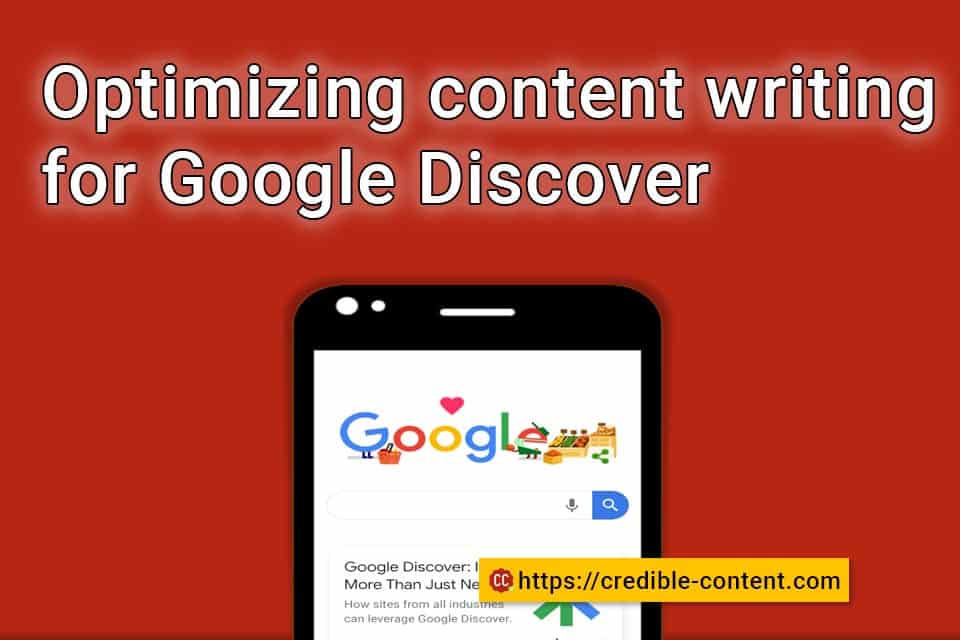Want Google Discover to find and showcase your content?
Google Discover is not exactly a new feature. Until recently it was called Google Feed. People have been using it for curation and content discovery.
What is Google Discover?
Do you use the Google app whose bar appears on the home screen of your mobile phone? If you tap on it and then tap on the Google icon at the top left corner, you enter the Google Discover area.
This is what Google has to say about Google Discover:
Discover new information and inspiration with Search, no query required.
In the same post (published in September 24, 2018) Google says that 800 million people are using this feature.
Instead of searching, you let Google “discover” quality content for you. Just so that it doesn’t completely take over, Google Discover allows you to enter topics in the Settings area.
It gives you suggestions based on your search history and you can also enter topics manually.
Once you are done with that, it automatically discovers new content according to your preferences.
It acts like your social media feed. You come across interesting content instead of actively finding information.
It reminds me of Flipboard. In Flipboard in the Settings section, you can add topics that you would like to track.
It is a passive information consumption. Google calls it “queryless search”.
People mostly use it to find latest news. I used it on some occasions for the same purpose.
Gradually I have also started using it to find content writing and content marketing related information.
Google Discover is available on all Android devices through the standard Google app.
If you’re logged into your Google account, you can also use Google Discover through your browser by going to google.com.
How does Google Discover work?
Google Discover uses two mechanisms to find what content you want to find without searching for it:
- Google News AI/ML (artificial intelligence/machine learning)
- Topic Layer in the Knowledge Graph
The basic thought process behind these mechanisms is that over a period of time Google traces your behavior on the Internet – what type of content you consume and what type of search queries you use on Google – and then tailors your feeds on Google Discover.
This is a highly advanced technology that Google has been working for many years.
The basic idea seems to be like this: for information you would proactively like to find, you can use the search function, otherwise, let Google find useful and interesting content for you based on your content consumption history.
You can further help the Google artificial intelligence to streamline your feeds by selecting “show more” or “show less” content from certain publishers.
Some also say that Google wants to keep the conventional search activity for advertising purposes (mostly promoted results show up) whereas for other content needs, it finds the content for you.
Content visibility on Google Discover may have a shorter shelf life
Remember that it’s a feed. A feed tends to have the latest information.
For how long your content remains visible on the feed also depends on the amount of content being published in your niche.
For example, news articles are constantly being updated. Hence, if you are a news publisher, your content may stay in front of your users for, let’s say, a couple of days.
But, if I’m tracking something like content writing or content marketing and if Google cannot find content worthy of showcasing, this sort of content may stay longer on the feeds.
How do you increase your chances of being featured on Google Discover through quality content?
You may wonder, if people are merely stumbling into interesting content without looking for it, why bother?
After all, when you target searcher intent, you want to write content for people who are actively looking for your business rather than those who are passively just looking for information.
As someone who is writing professional content all the time, I feel when your content gets featured in Google Discover, it increases your visibility for informational search intent.
If I want to look for a content writing service or a professional content writer, it doesn’t make sense to go to Google Discover and assume that Google is going to find a content writer or a copywriter for my business.
For this, I need to actively query the search engine with my specific requirement, something like “looking for an SEO content writer”.
On the other hand, if I simply want to find interesting content on the topics of content writing or SEO copywriting, instead of going to the trouble of entering the query and sifting through scores of results, I would rather leave it to Google to find the best content for me.
At least I won’t be encountering spammy content.
There is no need to underestimate Google Discover. Condé Nast in America claims to get 20% of its traffic from Discover these days.
So, how do you encourage your chances of being featured on the Google Discover feed?
Here are a few things you can take care of when you are writing and publishing content:
Publish content keeping the mobile readers in mind
Google Discover is on mobile apps. Hence, write your content accordingly.
Write short, crisp sentences. Be to the point. Organize your content in a manner that it is easy to read on a mobile phone.
Write and publish content that is easy to categorize
Remember that the feeds in Google Discover are based on the topics that people ask Google to track.
For example, “content writing”, “copywriting”, “SEO”, “content marketing” or “space exploration”. These are well-defined topics.
If you are writing something on content writing and you want it to be featured in Google Discover, make sure that your entire narrative revolves around the topic of content writing.
Write and publish useful, purposeful content
This advice also applies to general SEO, but it is more important if you want to feature on Google Discover. There are 2 reasons.
Suppose your content gets featured on Google Discover for a day. People tap on your link but then within a few seconds, come back to Google Discover.
Google assumes that you don’t have valuable content and kicks off the process of removing your content from the feed.
The second reason is, if people discover your content and mark it as “show less” not just your current content piece will disappear from Google Discover but even your future content pieces will have less chances of appearing in the feed.
Use good quality images when publishing content
Featured images help highlight your content. Even if your headline does not draw the audience, your image may.
Remember that Google Discover is a personalized feed. People want to see content that is highly relevant to their content consumption needs.
Don’t try to barge into the feeds simply because you want some exposure for your content hoping that it will generate business for you. This will be counter-productive.
If you want to optimize your content writing for Google Discover, focus on quality and relevance and of course, mobile friendliness.



